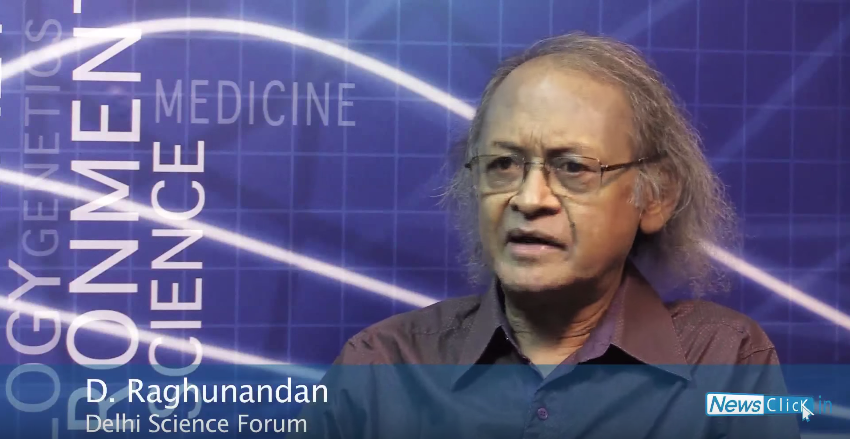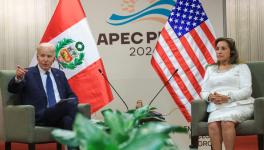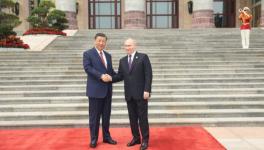The Climate Summits: Only Pledges and No Reviews
Newsclick interviewed D Raghunandan of Delhi Science Forum on India’s pledge regarding climate changes negotiations in Paris. The pledge was recently revealed in the documents presented by Prakash Javadekar. The documents contain India’s pledge towards global emission control target which is 33-35 % reduction in emission by 2030. Raghu believes that the stand revealed is the final stand of the government as the cabinet has endorsed it. He argues that the rest of the document is nothing but stretching of the same proposal. He also added that though these various documents presented in climate summits by different nations proposed the two degree criteria but if one looks at the pledges, the target should be around three to 3.5 degree Celsius. Raghu mentioned that these summits were supposed to follow the pattern of making pledges and reviewing it but the latter is not being implemented.

Rough Transcript:
PP - Hello and welcome to Newsclick. Today we will discuss with D.Raghunandan, the issues regarding the India's pledge on the climate change negotiations in Paris. Mr. Javadekar, the environment minister has made certain documents presented in it.
How the fundamental issues in the climate change negotiations coming up? and does this document address them?
DR - This is say position now of the Indian government, the cabinet has endorsed it and I believe when the Prime Minister had gone and met President Obama, he must have got his green signal to release this. This is the pledge that the government of India making for the Paris convention as India's contributions to the global emissions control targets, if you like, for reducing emissions in-order to tackle climate change. The headline offer that India has placed on the table is that, India would reduce it's emission intensity by 33-35%, compare to 2005 levels by the year 2030. The rest of the document is really a flusing out of this pledge that India has made.
PP - But Raghu, the more important issue for Paris climate change negotiations is to really address the issue, 'how much we need to cut emissions globally in-order to save the climate'. Now the whole purpose of this pledge and review was to reach a certain set of figures which could achieve. Thus summary of all these pledge and review at least by the biggies, which is already on the table. Do they showing a possibility of saving the climate?
DR - Not at all. The target was to reach a level of emission reductions which would ensure that temperature rise does not go beyond two degree Celsius. All calculations so far of all the pledges on the table and India was the last of the big country is to make this pledge; shows that if these are the emission reductions which are being pledged, then we are likely looking at 3-3.5 degrees sea rise in temperature, unless, of course there is some very very drastic cuts later after 2030 or 2035. The emissions gap are substantial. So from that point of view, this pledge by India is clearly not going to help, nor should one have expected that, it would. After all it is the onus on the developed countries to have met of bulk of the emission reduction targets. The Europeans have probably come the closest by pledging a 40% reduction compare to 1990 levels by 2030 but the United States is shamefully behind that, they have only offered 23-26% below 2005 levels, which amounts to only about 8% below 1990 levels, that is shameful. It is no contribution whatsoever. And following the US example, Canada, Japan, Australia which are the other big developed country emitters have also made pathetic emission reduction targets. So in view of that, this two degree sea target is way beyond reach and the so called pledge and review system, there are only pledges now and there is no sign of review.
PP - The United States and the developed world has probably something like 75-78% of the historical emissions and even today, the US is per capita, the largest emitter. Now forget all these issues aside. What is the principle on which we look at reduction of emissions, that is not at the table at all?
DR - Absolutely not. In fact, India having accepted the pledge and review methodology, which is what the Americans has put forward at Copenhagen, which was bulldozed through the Copenhagen summit but subsequently has found itself becoming from the defacto to a dejure position on the table and the negotiations. This is now the guiding principle. It is called common but differentiated responsibility only because the targets for developed countries may be different from the targets of developing countries but the principle remains the same; which is each country voluntarily makes a pledge which it thinks it can do or which it can put on the table but unless there is a mechanism no-1 as you say a carbon budget; there is only so much carbon that the atmosphere can take, therefore the carbon in the atmosphere needs to be reduced by so much or the emission needs to be reduced so much and this reduction, the burden sharing needs to be divided between the countries on the basis of equity and the common but differentiated responsibilities, that principle has clearly been given the go by and although India's document makes some platitudinous noises about climate justice and talks about India having low per capita; None of this has got built in to the mechanism by which this pledge is determined, nor, I think this is equally important, nor has India called into question the basis on which the pledges of the United States or Japan or other countries are, on what basis are those pledges? Do they meet the test of adequacy or not? There is to my mind, a deep collusion at work here and the idea seems to be 'I will keep quite about your emission if you don't say anything too much about mine'.
PP - If I understand correctly, the Kyoto principles of differentiated responsibilities essentially, common but differential responsibility. The differentiated is only now lip service that basic part is given up, every big emitters should reduce cap, etc. Second principle that is been also given up, which is all these were big issues in Copenhagen and in other climate change negotiations principle of equity. Per capita emission in this principle of equity and we could also propose other ones but nevertheless this seems to be the people have rights, people have energy rights, people would have rights to global sinks in that case and so on. So an equitable distribution of the baring capacity of the glob, that would be a principle of equity, that seems to be given up. So essentially right now there is no principle of which these emissions cuts being offered, is that correct?
DR - Absolutely none and that is the worse part of this exercise. OK, one can argue, could be really have expected India to do this when nobody else is doing it? China is not doing it, Brazil is not doing it. No other big developing country is calling into question. Everybody has fallen in line with this American idea of pledge and review, so could we have expected India to do it? but my argument would be India has been champion of the per capita argument from day one.
PP - Raghu, there is even a bigger issue. In terms of per capita energy consumption or per capita emissions, whichever the way you look at it, particular in terms of per capita energy consumption, India is actually at an end. It is not even a so called an emerging economy unlike Brazil or which is relatively much higher levels of energy consumption. So India's lining-up with the lower part of the developing countries would have made actually sense.
DR - Absolutely but then India has for it's geo-strategic reasons, decided to go with the big boss. It wants to show that we are one with the big boys
PP - Big boys or only one Big boy, the United States?
DR - The one big boy and others who are gathering around them. This is a G20 game. None of the G20 countries today are raising the per capita argument, everybody is happy to along saying, "I will do my pledge, you will do your pledge".
PP - But Raghu, only India really gains by per capita in the G20, others may not gain too much, except Brazil which is a very large hydro-electric, gas and the forests, therefore it's per capita emissions.
DR - The other aspect on this is, as you rightly pointed out, India is not only way down the list when it comes to per capita energy consumption or per capita emissions, India is also in the region which is among the worst affected by climate change. So it is not merely an existential problem for the islands who may drowned but it is also a major existential problem for India; climate change and it's impacts. That doesn't seems to figure in the Indian document on the INDC either and if the world is not going to meet the two degree target, I don't see India expressing it's major concern and close to an existential threat that it could face. It is almost as if this is just a board game and you put a number on the table and I put a number on the table and we go back and celebrate.
PP - Raghu, you talked about INDC as say the document. What does the INDC mean?
DR -The INDC is the acronym for Intended Nationally Determined Contribution to the overall emissions reduction which is going to be negotiated at Paris. Ironically, of-course, the document which initially laid down that countries should formulate these INDCs and the UN framework convention, the UN have expects this out, called for an extensive dialogues in each country, in-order to formulate this. Because this has implications for India's development. If you say, we are going to reduce our emission so much, that means changes in India's domestic policy, the way we run our economy, etc. There should be a wide consultation inside India so that there is a by and by different segments. There is been none. This is completely top-down exercise conducted in secret by the ministry.
PP - Though I don't see why you are calling top-down, I thought it is top and top?
DR - I mean top-down in the sense, it is top and being imposed on the rest with nobody else having had any. So if you don't have any national determination by this process, I wonder how this is going to get implemented at all.
PP - Let me break some of the mystery for you. This also talks about some astronomical sum of energy from nuclear, which is not going to happen so that is going to be quote.
DR - Exactly, so the total was 40% which they have said in this document. 40% of total electricity production would be from non-fossil fuel sources, which is hydro+nuclear+wind and solar. The nuclear is high as 63000 Megawatts and thats obviously nowhere near the horizon or the government has been clever in putting in rider, saying, provided we get fuel; which they know very well is not going to happen even if it does.
PP - The fuel you will get but essentially nuclear seems to be a dying technology in the world today, particularly after Fukushima.
DR - Exactly and you are not going to be able to afford it with all the risks that are involved. Hydro is also likely to be not a particularly promise something. You seem to have exhausted most of our resources. On that, except for a couple of pockets in the North-East, where again displacement issues are becoming major problems to be dealt with. So I don't see a very large scale expansion in Hydro. So it is going to be relying on a shift from coal to wind and solar; whether this is actually going to happen to the extend that, this government has claimed or not, I don't know. But I am even more concerned by the fact that a country which has waxed allegiant at least for so long on the issue of equity between nations and this document although doesn't translate in numbers, also talks about this a lot, has paid no attention to the question of equity of energy access within this country. If you are going to refurbish your development pathways and your energy utilisation and your emissions, should you not be paying attention to? even if you generate all these electricity using solar or wind, who is going to get the energy? for what is it going to be used? Are you going to redress inequities in energy which are as huge today within this country, as there are between the average Indian and the average American? There is virtually nothing in this document about that, either in-terms of cooking energy, domestic energy, transport energy, housing energy, which would redress this energy inequity which by the way, today India has finally accepted as part of the sustainable development goals and if you are going to actually address inequities in energy, I don't see that reflected in this document at all.
PP - So thats a discussion that we have to reserve for another day because I think that is a very important one. It is how you want to develop self, how energy should play a role, particularly if it is going to be capital lead development then the equity even remotely on the horizon. We will come back to you on these issues once again. Thank you for being with us, particularly to address the run-up to the Paris negotiations, which will continue to engage Newsclick and we will be engaging with you on this issue. Thank you very much.
DISCLAIMER: Please note that transcripts for Newsclick are typed from a recording of the program. Newsclick cannot guarantee their complete accuracy.
Get the latest reports & analysis with people's perspective on Protests, movements & deep analytical videos, discussions of the current affairs in your Telegram app. Subscribe to NewsClick's Telegram channel & get Real-Time updates on stories, as they get published on our website.























